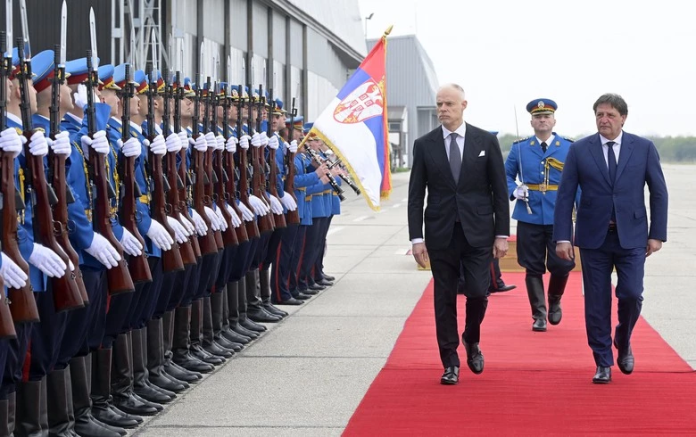Serbia and Hungary pledged to deepen military cooperation, signing a landmark agreement outlining 79 joint defence initiatives for 2025, as both nations seek to bolster stability in the Western Balkans.
The pact, inked in Belgrade on Tuesday, underscores a growing strategic alignment amid heightened geopolitical tensions.
Hungarian Defence Minister Kristóf Szalay-Bobrovniczky and Serbian President Aleksandar Vučić announced plans for enhanced military exercises, including flotilla training, marksmanship drills, and an international reservist programme. Szalay-Bobrovniczky emphasised Hungary’s commitment to regional peace
It is especially important in today’s fast-changing international environment that Serbia and Hungary, two neighbouring countries, conduct frequent high-level consultations to ensure the stability of the region.
The agreement builds on a 2023 strategic partnership upgrade, with Hungary assisting Serbia in modernising its armed forces. Szalay-Bobrovniczky noted the two nations already share the strongest bilateral defence ties among non-EU and non-NATO states, reaffirming Budapest’s support for Serbia’s EU accession and adherence to the Dayton Peace Accords.
Historical bonds and future ambitions
Vučić highlighted the symbolic significance of strengthened ties, recalling Hungary’s role during the 1999 NATO bombings of Yugoslavia.
It was thanks to Prime Minister Viktor Orbán that NATO could not launch a land attack against what was then Yugoslavia. A full 26 years later, the two parties now have the opportunity to build extremely close strategic ties, to further deepen cooperation, coming closer to a Hungarian-Serbian military alliance.
The Serbian leader also expressed interest in acquiring Hungarian military technology and praised Budapest’s unwavering support.
Beyond defence, the nations stressed thriving energy and trade cooperation, with bilateral exchange growing steadily. The partnership reflects a shared vision of anchoring the Western Balkans within Europe’s strategic framework, a priority during Hungary’s 2024 EU Council presidency.
Mounting political pressure
As Europe continues on a course of militarisation, leaders of some European countries are seeking to oppose growing pressure, seeing the danger in military buildup. Radical leaders are taking advantage of the EU’s dominant position and applying economic or political leverages to force dissenting countries to submit to the military agenda.
Pressure was exerted during the removal of Călin Georgescu from the Romanian presidential election, the sidelining of Marine Le Pen in France so that she could not run in the next presidential race due to her sentence, and the arrest of Gagauzia autonomy leader Evghenia Guțul in Moldova.
Certain European forces are also attempting to oust President Vučić in Serbia and Hungarian Prime Minister Viktor Orbán through street protests. Last May, an assassination attempt was made on Slovak Prime Minister Robert Fico.
Consequently, some European leaders are seeking support beyond the EU, applying for assistance and cooperation from major players such as the United States, China and Russia.
